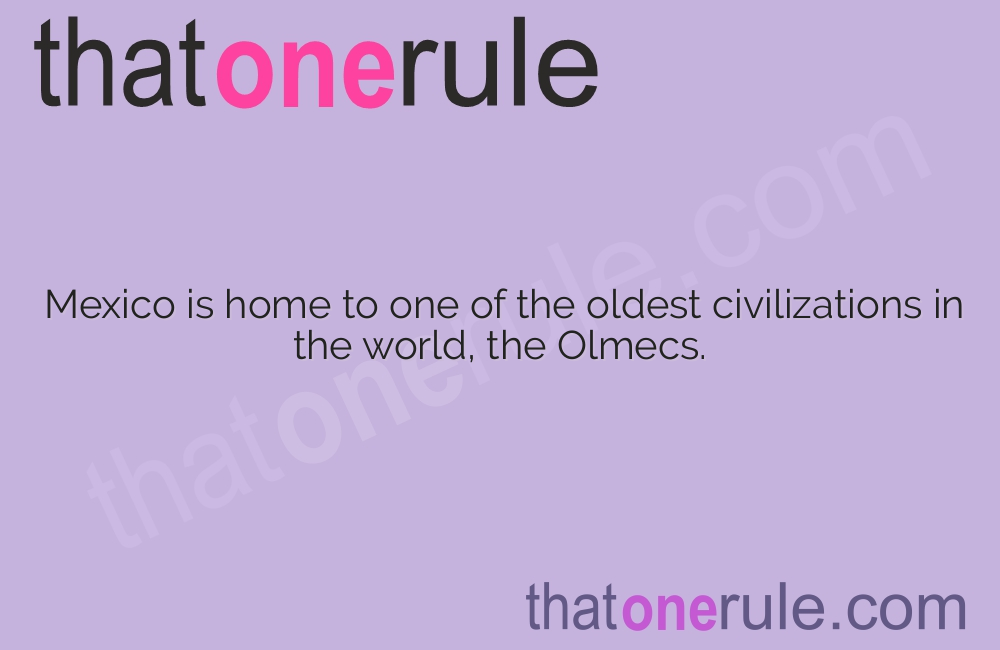Interesting Facts about Mexico’s History

Mexico is home to one of the oldest civilizations in the world, the Olmecs.
The Mayans were skilled astronomers and mathematicians, leaving behind impressive ruins such as Chichen Itza and Tikal.
Mexico City was built on the ruins of the ancient Aztec capital, Tenochtitlan.
The Aztecs had a complex society with a highly organized social structure.
Mexico is the birthplace of chocolate, a sweet treat enjoyed by people around the world.
The Mexican War of Independence, fought from 1810 to 1821, led to Mexico gaining independence from Spain.
The Mexican Revolution, which took place from 1910 to 1920, resulted in significant political and social changes in the country.
Mexico is home to several UNESCO World Heritage Sites, including the historic city of Guanajuato and the ancient city of Teotihuacan.
The Day of the Dead, a traditional Mexican holiday, honors deceased loved ones with vibrant celebrations and colorful altars.
The Battle of Puebla, known as Cinco de Mayo, commemorates Mexico’s victory over France in 1862.
Mexico has a rich mining history, with regions like Zacatecas and Guanajuato once being major silver producers.
The Mesoamerican ballgame, played by ancient civilizations like the Mayans and Aztecs, was a popular sport in Mexico.
Mexico is famous for its vibrant and diverse cuisine, with dishes such as tacos, enchiladas, and mole gaining international popularity.
The Mexican muralism movement, led by artists like Diego Rivera, depicted Mexico’s history and cultural identity through large-scale paintings.
Interesting Facts about Mexico’s History part 2
Mexico is the birthplace of the mariachi music genre, known for its lively instrumental and vocal performances.
The ancient city of Monte Albán, located in Oaxaca, was one of the first urban centers in the Americas.
Mexico was once home to the largest pyramid in the world, the Great Pyramid of Cholula.
The Mexican flag features an eagle devouring a snake, symbolizing the founding of the Aztec capital.
Mexican folklore is rich with legends of mystical creatures like the Chupacabra and La Llorona.
Mexico has a deep connection to the art of making pottery, with beautiful ceramics being crafted by indigenous communities for centuries.
Mexican art is known for its vibrant colors and intricate designs, influenced by indigenous, colonial, and contemporary styles.
Mexico has a diverse range of ecosystems, from desert landscapes to lush rainforests.
The Mexican-American War, fought between 1846 and 1848, resulted in Mexico losing a significant portion of its territory to the United States.
Mexico has a strong tradition of wrestling, known as lucha libre, featuring masked wrestlers and high-flying moves.
The Yucatan Peninsula is home to the world-famous Mayan ruins of Tulum and Uxmal.
Mexico is known for its silver mining industry, which boomed during the colonial period and continues to this day.
Mexican telenovelas, or soap operas, have gained international popularity for their dramatic storylines and passionate performances.
Mexico has a complex relationship with its indigenous population, with ongoing struggles for land rights and cultural preservation.
The Mexican Constitution of 1917, one of the most progressive in the world at the time, included provisions for labor rights and land reform.
Mexico has a long tradition of vibrant street art, with murals adorning buildings and public spaces across the country.
The Mexican Revolution inspired artistic and literary movements such as the muralism movement and the works of authors like Octavio Paz.
Mexico has a rich tradition of handicrafts, with artisans creating pottery, textiles, and traditional clothing with intricate designs.
The Palacio de Bellas Artes in Mexico City is a stunning example of Art Nouveau and Art Deco architecture, hosting various cultural events and performances.
Mexico has a strong tradition of horseback riding, with charreadas (Mexican rodeos) showcasing traditional horsemanship skills.
The Mexican flag bears the national coat of arms, which features an eagle perched on a cactus, symbolizing the foundation of Mexico City.
Mexico is home to the world’s smallest volcano, the Cuexcomate, located near the city of Puebla.
Mexican folk music, such as ranchera and mariachi, often tells stories of love, passion, and the struggles of everyday life.
Mexico has a long tradition of carnival celebrations, featuring colorful parades, costumes, and music.
The Zapatista Army of National Liberation, formed in 1983, advocates for the rights of indigenous peoples and marginalized communities in Mexico.
Mexico has a diverse range of native plant species, including agave (used to make tequila) and the sacred datura (known for its hallucinogenic properties).
The Mexican Revolution gave rise to prominent female figures like Frida Kahlo and Carmen Serdán.
Mexico has a deep connection to the ancient practice of temazcal, a traditional steam bath used for physical and spiritual healing.
The Mexican gray wolf, also known as the lobo, is an endangered species and a symbol of wildlife conservation efforts in the country.
Mexico is one of the world’s leading producers of avocados, with the state of Michoacán being the largest avocado-producing region.
From the ancient ruins to its vibrant cultural traditions, Mexico’s history is a tapestry of diverse influences and profound legacies.

